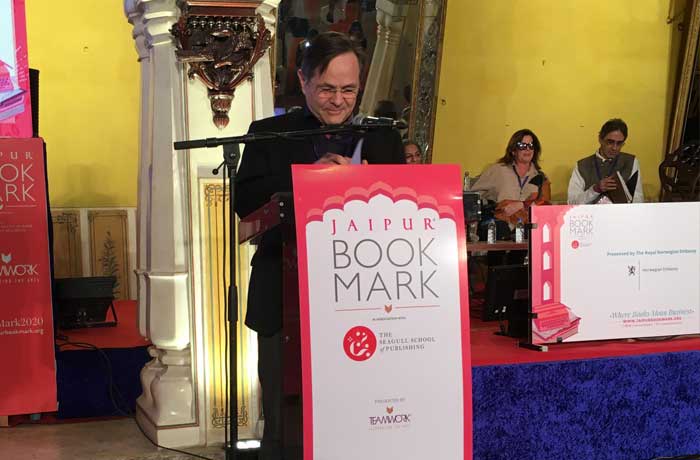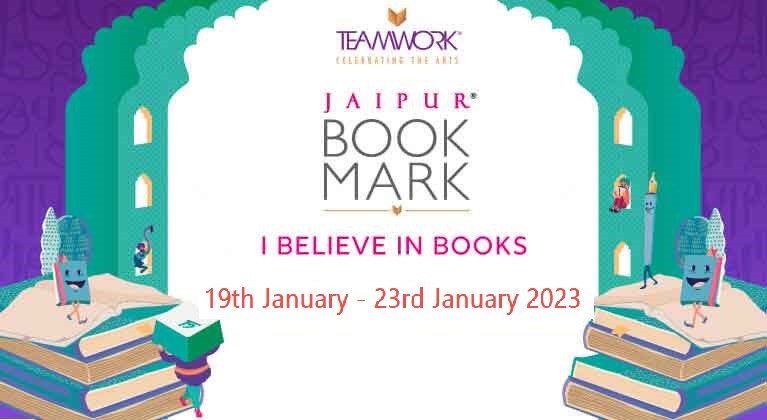by Ishan Roy

Towards a Borderless Literature
Keynote Address by Berthold Franke, AJ Thomas, Chandra Prakash Deval, Jo Lendle, Jules Levinson and Vera Michalski in conversation with Urvashi Butalia
Imagine that you’re growing up in a small, tropical village by the sea. Books are your companions. One day, you read a novel by Dostoevsky. You start imagining a world different from your own. You read about ice and strange social customs. You may not know this yet, but you’ve just travelled away from your village for the first time. Such is the power of translation. It reduces the boundary between stories emerging from places as disparate as Congo and Panama. Translation was also the key point of discussion in a talk at Jaipur BookMark 2020 between writers and publishers from across the globe. The session began with a moving address on the transformative powers of translation by Berthold Franke, the director of Max Mueller Bhavan in New Delhi. Taking Dr. Franke’s lead, the writers, publishers and translators present on the dais launched into a spirited conversation on the merits of translation, the therapeutic power of moving between languages and the challenges associated with both.
"Why do we need translation? Because we cannot read all languages. Simple and complete answer, " so began Franke. He expanded on this seemingly humble assertion by comparing translation to the process of ferrying a boat. The translator helms a boat, she carries stories across the shores of different languages, passing through continents and time periods. “The paradox of literature is also the paradox of language,” he stated, pointing out that language is freedom, even if it acts as a barrier.
Crossing borders between literatures of the world was a recurrent theme that surfaced more than once during the discussion. The publisher Vera Michalski spoke about building bridges between Eastern and Western Europe through translation. She was always surprised each time a book that seemed very different from the sensibilities of her home audience turned into a hit, reminding everyone at the Durbar Hall that readers everywhere are not so different from each other. The writer-translators Chandra Prakash Deval and AJ Thomas, for instance, sustained themselves on a steady diet of Russian literature. It could be argued that a Rajasthani and Malayali have little in common with the grimy milieu of nineteenth century Moscow. “These stories never get over” said Deval, observing that literature is a great ocean that has the capacity of absorbing many languages and voices.
However, the panel also brought up the pertinent challenges of a process like translation. Writer-publisher Urvashi Butalia spoke about the possibilities and limitations of translation. She noted that Simone de Beauvoir's seminal feminist text The Second Sex was translated by a man. This turned out to be a double-edged sword as he exercised important bits; thus giving a slightly different version to a particular readership. The academic Jules Levinson expanded upon the frustrating but ultimately rewarding experience of translating esoteric Tibetan Buddhist texts. "The strangeness of the literary form (Tibetan) makes translation difficult. They tell naturally human stories but getting to them is a lot of work,” he observed.
"We have to make it possible for the reader to understand a different context of life and death,” he added. Given that Tibetan shares no base with any classical language, be it Sanskrit or Latin; it is a language like an island. Translation, then, is not an easy task. Levinson honestly stated that translators working with Tibetan literature have only just figured out the technicalities of the language.
Finally, the writer and editor Jo Lendle spoke about the necessity of not considering translation as “losing something”. He flipped the ‘lost in translation’ narrative on its head by saying that “Nobody knows a text better than a translator. Not the publisher and not even the author”. Ultimately, every reader is a translator. Words that leap off the pages of a book and enter your consciousness have already crossed many borders and they all end in the infinite ocean of literature.






